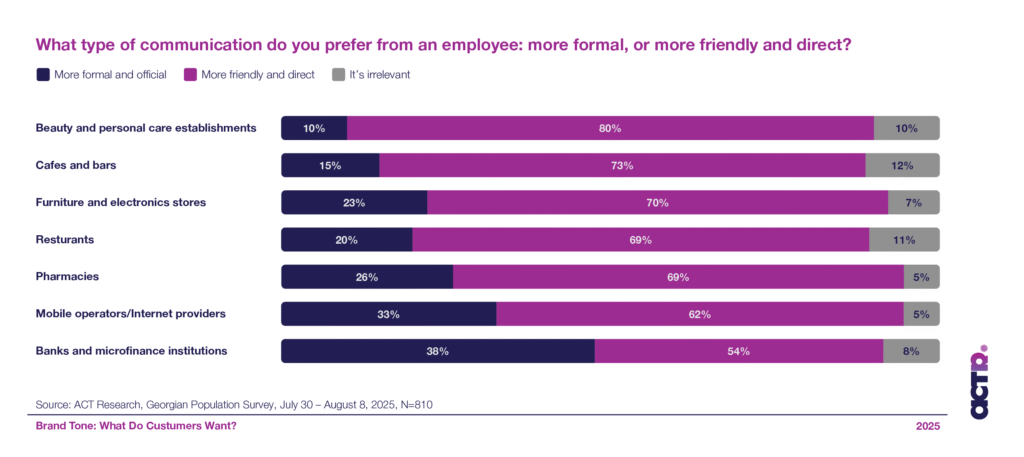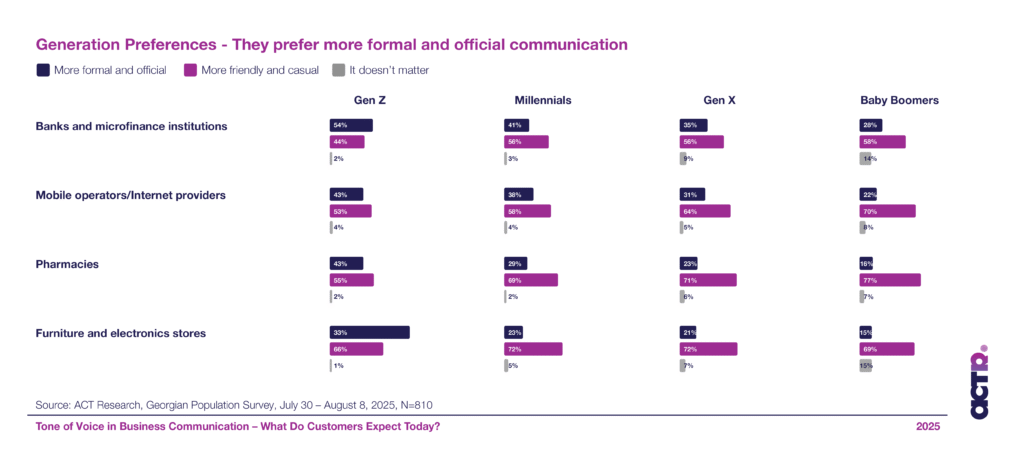Tone of Voice in Business Communication – What Do Customers Expect Today?

Tone of Voice in Business Communication – What Do Customers Expect Today?
In recent years, global Customer Experience (CX) studies have confirmed that when a brand communicates with clarity, empathy, and consistency, customers are more likely to trust, engage, and ultimately remain loyal. Below are several key insights and recommendations shared by leading international companies:
- According to PricewaterhouseCoopers, customers do not evaluate a brand solely by its price or product. The consistency of the brand’s voice, its tone, and its transparency play a crucial role in building trust.
- According to Harvard Business Review, brands that build their communication with empathy achieve higher satisfaction rates and stronger customer recommendations.
- McKinsey recommends that businesses include “Tone of Voice” as a separate key KPI in CX design.
What Does the Situation in Georgia Look Like, and How Do Global Trends Reflect Local Realities?
To explore this topic in the Georgian context, ACT Research conducted a nationwide survey of the population.
Customer Experience (CX) research shows that Georgian customers tend to value friendly and direct communication across almost all industries.

While it is true that a friendly tone leads, this does not necessarily indicate that formal communication is no longer needed. For example, when interacting with mobile operators, internet providers, banks, or microfinance organizations, 33–38% of customers still prefer a formal tone.
A particularly interesting trend stands out across generations in specific industries:

In industries such as banks, microfinance institutions, mobile operators, pharmacies, and furniture/electronics stores, the preference for formal and official communication decreases as customer age increases. Based on international practices, this trend can potentially be explained as follows:
- Gen Z and Millennials: This audience is informed and critical – they perceive safety, reliability, and professionalism through formality. However, for them, formality does not mean complicated procedures; rather, it signifies clear, fast, and customer-focused communication.
- Gen X and Baby Boomers: They require more emotional support in communication and seek simplicity and interaction in a more easily understandable tone.
Both Georgian and international practices confirm that customers and their preferences and behaviors are not always the same. Accordingly, businesses cannot make a rigid choice between being friendly or formal. Every business needs to establish an adaptable, segmented tone of voice.
How Can a Brand Manage Its Tone of Voice Effectively?
- Including or Reviewing the Tone of Voice in the CX Strategy Is Essential.
Based on the client segment and industry, the brand should establish communication guidelines that specify where formality is required and where a more relaxed tone is appropriate. - “Service Scripts” Should Be Dynamic and Adaptable.
International practice shows that the best brands create flexible scripts, allowing employees to adjust tone and word choice according to the type of customer and the situation. - It Is Important to Review and Update Staff Training Modules.
Today, merely knowing the standard is not enough – employees need tools to quickly “switch” their communication tone according to the situation and the type of customer. - Monitoring and Periodic Updates to Tone of Voice Are Essential.
Regular monitoring and, if necessary, adjustment of content and interactions (social media, chats, calls, face-to-face communication) ensure that the tone remains authentic and aligned with customer expectations.
The survey was conducted using a random sampling method among 810 adults across Georgia. It was carried out between July 30 and August 8, 2025. The average statistical margin of error does not exceed 3.5%. Method: telephone survey.
This study was conducted at the initiative of the company “ACT Research” (ACTR) within the framework of its Corporate Social Responsibility (CSR) program, under the rubric “The Voice of the Customer.”
ACTR’s CSR policy is based on an approach focused on public well-being and the generation of timely, evidence-based data to better understand societal issues. To this end, ACTR periodically conducts public opinion research in four main areas:
“Voice of Society” – studying social and civic attitudes;
“Voice of the Consumer” – analysis of consumer behavior and needs;
“Voice of Business” – research on private sector trends and expectations;
“Digital Trends” – monitoring technological and digital changes.
The goal of the initiative is to improve access to data and promote informed, public interest–based decision-making in both the private and public sectors.
ACTR ensures data transparency and accessibility – as one of the key mechanisms for creating public value.